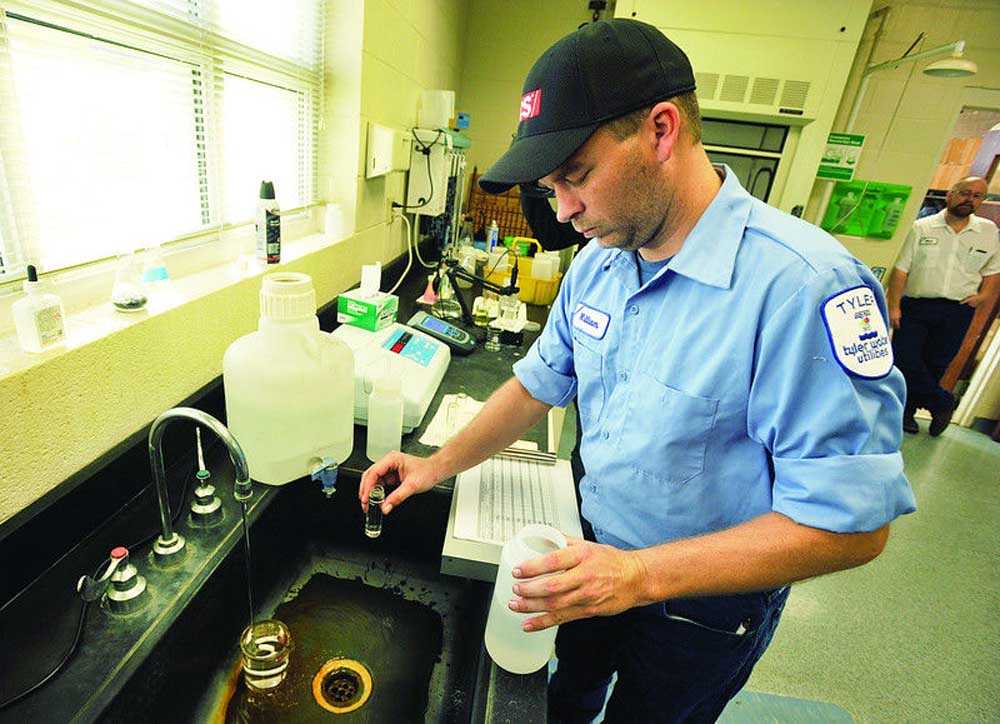Water, wastewater rate increases could cost an extra $8.40 a month
Published 11:39 pm Wednesday, July 27, 2016

- Plant operator William Bushong runs routine chlorine and pH tests on a sample at the Tyler Utilities Lake Palestine Water Treatment Plant. Andrew D. Brosig/Tyler Morning Telegraph
Washing hands and cleaning clothes soon will be more expensive for Tyler Water Utilities customers.
The city’s water department is proposing rate increases on both water and wastewater services, with a proposed impact of $8.40 monthly for the average customer with a household usage of 10,000 gallons.
The department operates as an enterprise fund, structured similar to a business. The department does not receive money from the general fund for its operations.
The utilities fund is budgeting to receive $40.5 million in revenues, up $2.8 million from where the city expects to end this fiscal year at $37.6 million.
The city’s water rate structure includes two parts – a base rate and a volumetric rate based on consumption. The rate increase proposal includes an across the board 5 percent increase on water rates. The wastewater rates will see a $1.50 increase on its base rate and a 54-cent increase on the volumetric rate. City officials have not indicated when the rate increases will take effect, but the city’s new budget year begins Oct. 1.
A customer with a low usage of 2,000 gallons can expect to pay $28.89, up $2.26 from a current bill of $26.63, equating to an 8.5 percent increase.
A family that uses $5,000 gallons can expect a bill of $48.63, up from $4.56 from a current bill of $44.06, representing a 10.4 percent increase.
A customer that uses 10,000 gallons can expect an $81.51 bill, up $8.40 from a current bill of $73.11, or an 11.5 percent increase.
The increases were recommended by the consulting firm NewGen Strategies and Solutions, which gave a presentation on its findings to the Tyler City Council on Wednesday.
Revenue from the increases will be used to fund major capital improvement projects, including those required by regulatory agencies as well as general improvements to the systems.
Over the next 10 years, the city anticipates spending $96.9 million on 100 projects to improve its wastewater systems.
Of that, $23.7 million will be for water projects required by state and federal regulatory agencies, and another $23.2 million for mandatory wastewater projects.
Parts of the infrastructure are old. The city is celebrating 100 years of having a water system, and some of the current pipes came with the sale.
“We have had infrastructure problems for a long time,” Councilman Darryl Bowdre said Wednesday after a rate presentation. “We have kicked the can down the road, and now it’s time. If you think the streets are in bad shape, which I get a lot of calls on, what do you think the condition is for the things underneath the streets? This is something that has to be done.”
The department has 33,700 water customers and 32,300 sanitary sewer customers. It maintains 742 miles of water distribution lines, 715 miles of sanitary sewer lines, as well as four treatment plants – two for water and two for wastewater.
The city of Tyler has no general obligation, or taxpayer, debt, but the water department is able to take out revenue-backed bonds. Those bonds are repaid with revenue from providing services. The department currently has about $63 million in revenue-backed debt and makes payments of about $6 million annually.
The city needs to have 90 days of operating capital in the bank to get a better bond rating to continue taking out bonds to upgrade the system. Under the current rate structure, the city projects it would be $2.3 million below the threshold in 2017. After the rate increase, it would be $8.3 million in the black.
Tyler has committed that 15 percent of its $40.5 million utilities budget would be used to complete projects with cash.
The result is spending roughly $6 million a year on cash projects and spending another $6 million on paying back revenue bonds. The ratio of cash to debt projects is 1:1.
The Tyler City Council audibly gasped Wednesday when Chris Ekrut, with NewGen Strategies, told them most cities pay for 20 percent of their projects with cash and 80 percent with debt.
“Most utilities are extremely leveraged on debt. The amount of cash you’re putting into your system is highly unusual,” he said, adding he wished all cities were 50/50 like Tyler. “I cannot speak highly enough of your financial performance and what you are doing with your cash fund.”
Ekrut’s analysis suggests this should be the last rate increase for several years on water service, but he recommended increasing the wastewater side for several more years.
“Wastewater is not as strong, and the water (operation) supports the wastewater, but this is not unusual,” he said. “It is very difficult for ratepayers to understand that wastewater is more expensive than water. We have to safely dispose of that (excrement), and in the current political environment, treating wastewater is becoming very expensive.”
In 2017, the department also plans to add four new employees. Two of those employees would work on wastewater collection maintenance and two would work on the hydrant flushing program, which releases water at certain points where it can bottleneck in the system.
Twitter: @TMTFaith






